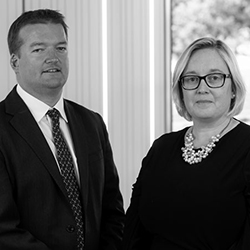 Deloitte Channel Islands Partners Theo Brennand and Siobhan Durcan on the importance of audit – published in the Future View supplement included with the May-July 2021 issue of Businesslife
Deloitte Channel Islands Partners Theo Brennand and Siobhan Durcan on the importance of audit – published in the Future View supplement included with the May-July 2021 issue of Businesslife
One of the major questions raised by commentators has been whether large professional services firms providing both audit and advisory services create issues around conflicts of interest and their ability to challenge companies.
During this time, there were suggestions that the Big Four firms should be broken up to address this (referred to as structural separation).
Although structural separation isn’t happening now, the Financial Reporting Council announced in July 2020 how it intends to address this issue. It has set out a series of principles that the Big Four firms will need to apply between their audit and advisory businesses. This is known as operational separation.
The objectives of operational separation are to ensure that Big Four firms’ audit practices are focused above all on delivery of high-quality audits in the public interest, and do not rely on persistent cross-subsidies from the rest of the firm.
As a result of this change, there will be a ring-fenced audit business that provides audit and assurance services to clients that are allowable under the revised ethical standards.
High audit quality
High audit quality outcomes have never been more critical for stakeholders, people and society. Audit firms need to constantly evolve to keep raising the bar on delivering the highest possible standards of audit and assurance quality.
 Robust professional scepticism is vital to delivering high-quality audits. However, recent events have reinforced the need for a broad focus on internal controls, fraud and viability, which are critical to assessing whether a business is honestly run and has a future.
Robust professional scepticism is vital to delivering high-quality audits. However, recent events have reinforced the need for a broad focus on internal controls, fraud and viability, which are critical to assessing whether a business is honestly run and has a future.
The scope of an audit is also changing. It is expected that UK SOX – a UK version of the Sarbanes-Oxley Act – as well as front-half assurance in areas such as climate and diversity disclosures, will become an important feature of our largest and most complex audits, both public and private.
Market and regulatory drivers, such as audit quality and growth in demand for high-quality assurance services, independence, competition and choice, contribute to the audit product becoming more evolved.
There is no doubt that audits are becoming more complex and challenging. Audit relationships – especially those in Jersey and Guernsey, where many businesses are headquartered or consolidated – operate across borders and have to navigate the complexity of local country requirements.
There is the need to draw upon deep knowledge specialists such as IT, corporate finance, tax and valuation experts, all of whom are becoming ever more important to the audit process to provide the robust challenge to support judgements and conclusions reached.
Future of audit
We have seen a significant increase in the demand for wider assurances services. Companies and their investors want an independent assessment of more than just the historic numbers.
While this started with listed companies and increased assurance over the front half of their financial statements, this is broadening to private companies.
Independent controls assurance reports are now seen as a requirement for a lot of investors and we are seeing this expand into other areas, particularly around responsible investing and ESG.
In order to ensure that we have the right skillset to deliver the audit of the future, we work closely with local schools. We adopt a ground-up approach of supporting, mentoring and coaching to enable high-calibre local students to achieve success in joining the workforce straight from school as well as from university.
In addition to offering skills sessions across schools, we have recently partnered with Hautlieu School, sponsoring the IBCP scheme, where students study accounting exams as well as their IB subjects.
We donated more than 80 laptops to assist students in their studies through the challenging Covid-19 period so their learning did not fall behind.
This is in addition to piloting with Every Child Our Future (ECOF), the numeracy programme that ensures primary school children have mastered numeracy and analytical skills before heading into secondary education and have the building blocks for future success.
Deloitte in the Channel Islands
While the regulations only require the Big Four firms to separate from 2024, at Deloitte we have taken a proactive approach and will implement an operationally separate model from 1 June 2021.
We will still continue to focus on our core markets of private equity, real estate, debt, asset servicing, family offices, banking and insurance.
Deloitte in the Channel Islands is part of our UK practice, and our close alignment as part of the UK firm also enables us to leverage off our market-leading experience and a team of more than 20,000 professionals.
 What makes a successful audit?
What makes a successful audit?
There is, quite rightly, an increased focus on the quality of the audit work performed by the auditor, but we believe a successful audit is driven by:
• Early engagement between the audit partner, the board and the management team and regular open communication
• Planning early, considering areas of operational stretch across the business, as there will be pinch points within all companies
• Agreeing upfront on the additional areas on which the board or management would appreciate insights. For example, companies should be using the audit to get an independent view on the quality of their controls, their teams or how they operate across different jurisdictions.